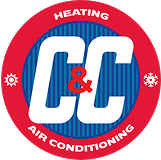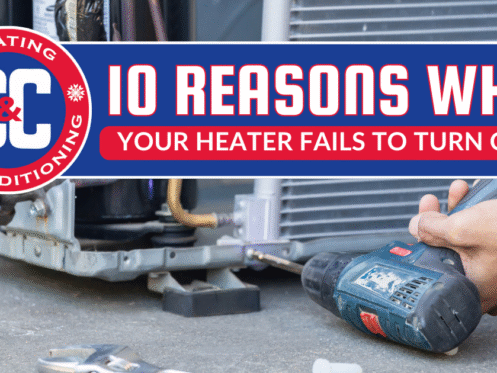10 Reasons Why Your Heater Won’t Turn Off in Macomb, MI
During the cold months, you might need to use your heating system for longer stretches of time because the winters in Michigan are frigid and unforgiving. But this doesn’t mean that the unit should run continuously. If your heater fails to turn off even after reaching the set temperature, there may be some repair issues that have to be assessed and addressed.
A furnace that continues to run longer than needed will spike energy bills, create discomfort, and wear out the overall HVAC system. Below are some of the reasons why your heater could be running continuously and how to solve them.
- Thermostat Malfunctions and Incorrect Settings
- Damaged Primary Controller or Limit Switch Failures
- You Have a Defective Air Valve
- Clogged Air Filters Restricting Airflow
- Blower Motor Issues Leading to Continuous Operation
- Leaky Ductwork Causing Heat Loss
- Inadequate Home Insulation Increasing Heat Demand
- Incorrectly Sized Heating Systems
- Aging Heating Equipment Losing Efficiency
- Blocked or Closed Air Vents Hindering Air Circulation
From incorrect thermostat settings to a faulty limit switch, clogged air filters, or even blocked air vents, there is a solution for it all. The professional HVAC technicians from Service Genius have compiled some troubleshooting tips for addressing the causes of a heating system that runs continuously.
1. Thermostat Malfunctions and Incorrect Settings
If your heater won’t turn off, the first thing to check is the thermostat. The thermostat controls the operation of the heating system. It detects the indoor temperature and signals the furnace to start or stop. So, if the thermostat malfunctions, it can signal the unit to run continuously.
First, check the thermostat settings. If someone changes the fan setting to “on,” for instance, the blower motor will run continuously at any temperature. You can resolve this issue by changing the setting to “auto”, so that the blower only operates when the furnace is running.
A heater working hard to maintain high temperatures can run continuously, especially when the outside temperature is frigid. If your heater fails to shut off, try lowering the temperature settings. Give it a few minutes and observe how it works.
2. Damaged Primary Controller or Limit Switch Failures
The heating system in your home likely has a primary controller that responds to the thermostat and controls the unit’s start-up and run cycle. If the primary controller is damaged, the furnace shut-off mechanism will not work.
When this problem is the underlying cause of the furnace’s continuous running, you will need to call a professional HVAC technician for help. Unfortunately, this problem is a bit complex for DIY troubleshooting steps.
3. You Have a Defective Check Valve
If you rely on a boiler heating system, its check valve would be responsible for checking and adjusting the temperature setting. A faulty check valve can cause the heater to run continuously because it allows water to circulate without regulation, keeping the heating system on. Call an HVAC technician to replace the check valve to resolve this issue.
4. Clogged Air Filters Restricting Airflow
The air filters of any HVAC system play a vital role in the heating and cooling processes alike. They capture dust particles, pollen, pet dander, and other contaminants from your indoor air, preventing them from reaching the heat exchanger. When neglected, such debris accumulates in the air filter and causes airflow issues.
A dirty air filter dramatically reduces the airflow throughout the heating system. As a result, the furnace won’t be able to circulate enough heat through your house. It will keep running in an attempt to match the desired temperature setting on the thermostat.
To avoid such issues, change the dirty filters out every three months. If you have pets or live in a highly dusty area, HVAC technicians recommend changing the air filters more often, preferably once every 4 weeks. For reusable filter models, clean them frequently. A unit with a clean air filter works optimally, and you should notice a significant difference in the airflow volume.
5. Blower Motor Issues Leading to Continuous Operation
The blower motor’s main function is to circulate warm air from the heater into all the rooms in your house. If the blower malfunctions and fails to circulate warm air into the home, the thermostat will signal the unit to continue running. Continuous running with no change to the current room temperature is a sure sign that something is wrong with the blower motor.
Fixing the blower motor is not a DIY project— you will need a furnace repair technician! It contains some mechanical and electrical components that require extensive knowledge and skills to handle. In case you spot a problem with the blower motor, contact an HVAC professional immediately. They can diagnose the exact cause of the problem and recommend the most viable solution.
6. Leaky Ductwork Causing Heat Loss
Damaged or leaky ductwork allows the heated air to seep out of its cracks. This causes the heater to work harder and longer than it should. If your heater won’t shut off and you also notice uneven temperatures in different rooms in your house, you could have leaky ducts.
Walk around and inspect the visible part of the ductwork for holes and gaps, and seal them. If you are unsure of the exact location of the leak, have a technician inspect the ductwork and seal the leaks for you.
7. Inadequate Home Insulation Increasing Heat Demand
Heat always flows from hot to cold areas. If there are gaps in the insulation of your house, the warm air will escape, so your heating system will work harder and longer to reach the desired temperature. Check the insulation on your windows, doors, and floors, or better yet, call a professional HVAC technician to help you with this task!
Insulating your windows, doors, floors, and walls adequately will go a long way to conserving the generated heat in your home and lowering the strain on your heater. Also, remember to insulate the ductwork that passes through uninsulated areas, such as the attic, crawlspace, and basement. Insulation is a key component to ensure your furnace or other heating system is functioning properly.
8. Incorrectly Sized Heating Systems
If the home has an undersized furnace, it will struggle to meet the home’s heating requirements. As a result, it will run continuously in an attempt to maintain a consistent indoor temperature. On the other hand, if you have a heater that is too large, it heats your house extremely quickly and shuts off before the heat can travel evenly throughout the house. Thus, it will keep turning on and off after a short period. If your heater won’t shut off, it’s probably the wrong size.
Consult an HVAC professional to help you select a heating system that is sized appropriately for your house, taking into account its insulation level, local climate, window location, and the number of occupants.
9. Aging Heating Equipment Losing Efficiency
With age, the furnace loses its capacity to cool the house adequately. Various components begin to wear out, decreasing the furnace’s energy efficiency. It will need to run longer than usual to keep the home at the desired temperature set on the thermostat. If your furnace shut-off mechanism isn’t working properly, and it is pretty old anyway, it is time to consider upgrading to a new and more efficient unit.
10. Blocked or Closed Air Vents Hindering Air Circulation
Blocked air vents can significantly affect how your heater functions. The obstructions diminish airflow, so the system may not heat your house adequately, and it will thus run longer. Walk around the house and ensure that you keep furniture and other objects away from the vents. Keep the grills clean and dust-free to maintain proper airflow.
When to Seek Professional HVAC Assistance
If your heater still won’t turn off after trying out all the above solutions, it’s time to call an HVAC professional at C & C Heating & Air Conditioning. Sometimes, it could be due to a fault in the control board or wires connecting to the thermostat. The bottom line is that only with professional help can you truly get to the bottom of such issues. Learn more about available Energy Star Rebates!
Whenever you need help with your heater, reach out to C & C Heating & Air Conditioning. We provide a full range of heating and cooling services. Our company also offers duct cleaning, water heaters, air filtration systems, and UV light services in Roseville, MI, and the surrounding areas. Contact us today to schedule an inspection!






